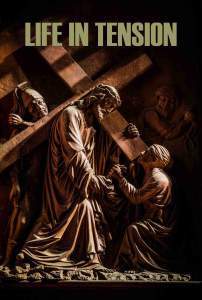Stephen W. Hiemstra's Blog, page 238
October 17, 2016
Aparición Especial en Radio Vida Mañana (Special Guest on Radio Vida on Tuesday Evening): Stephen W. Hiemstra
 Mañana es un buen tiempo a visitar a Radio Vida. Voy a hacer una aparición especial y voy a enfocar de aspectos de mi nuevo libro, La Vida en Tensión.
Mañana es un buen tiempo a visitar a Radio Vida. Voy a hacer una aparición especial y voy a enfocar de aspectos de mi nuevo libro, La Vida en Tensión.
(Tomorrow is a good evening to check out Radio Vida. I will be a special guest and will be talking about aspects of my new book, Life in Tension.)
Please join us.
Listen to Radio Broadcast (Spanish)
Radio Vida VA 97.7 FM los martes a las 8:30 p.m. hasta 9:30 p.m. EST (toca)
(Radio Vida VA 97.7 FM Tuesdays from 8:30 p.m. until 9:30 p.m. EST (link))
Contact:
Julio and Ana Martinez
11100 Ravine Drive
Manassas, VA 20111
202-489-1990
MartinezPeraltaJulio@gmail.com


October 16, 2016
Prayer for Those in Peril

Winter Trees by Sharron Beg (www.threadpaintersart.blogspot.com)
Almighty God,
We thank you for the security of a roof over our heads, gas to power our heaters, and power to run our appliances.
Help us to remember those that lack these things.
We thank you for the accident of our birth that gave us food to eat, clean water to drink, and sanitary plumbing to use.
Help us to remember those that lack these things.
We thank you for the protection of honest police, the care of competent physicians, and the instruction of educated teachers.
Help us to remember those that lack these things.
Oh dear, Lord, give us discerning minds, tender hearts, and helping hands,
when we forget who we are and how you have called us.
In the power of your Holy Spirit, bridge the gap
between discerning minds and the ones we have,
between tender hearts and the ones we have,
between helping hands and the ones we have.
Forgive us, heal us, and save us from our gaps.
In Jesus’ precious name, Amen.


October 14, 2016
Why Finish College?
 “Jesus said to him, No one who puts his hand to the plow
“Jesus said to him, No one who puts his hand to the plow
and looks back is fit for the kingdom of God.” (Luke 9:62)
Why Finish College?
By Stephen W. Hiemstra
During my sophomore year in college (1973) I held some interesting jobs and it was not altogether clear that I would continue my studies as I explored quitting school to take full-time work.
In my work with the Indiana Public Interest Research Group (INPIRG), I worked as a community organizer attending local groups in the western side of Bloomington—on the other side of the railroad tracks—which did not get a lot of attention from local politicians.
The example of this work that stands out in my mind was a house that burned down in a neighborhood which stood just over the city limits. The structure was left in the condition that remained after fire-fighters put out the blaze—the basement was flooded and local kids were using the place as a informal pool, floating inner-tubes in the debris and generally using the property as a playground. I took photographs of the place down to city hall and spoke with officials about it one day. Hiding a tape-recorder under my jacket, I recorded a city attorney who said nothing could be done because the place had been abandoned by the owners and was in any case outside the city limits; he then proceeded to lecture me about the need for better childcare among concerned parents. I later led a community demonstration in front of city hall and brought a delegation to testify before the next city counsel meeting.
My life as a community organizer came to an end later when I interviewed unsuccessfully for a position as a local community organizer.
Another attempt that I made to find work brought me to respond to an ad in the paper for a job as a telemarketer for a local police organization. The job involved sitting in a room at a table with a bunch of telephones and calling everyone in the telephone book, one after another. With each call, we were instructed to ask for the man of the house, perhaps, with the logic that men would be more inclined to offer donations to the policy organization. However, this instruction proved to be difficult to implement because many men over the years had died in accidents working in local rock quarries. When you would ask for the man of the house, the man’s widow would just break out in tears right there on the phone. After about a week of tearful phone calls, I quit.
At the end of my sophomore year, I returned to Virginia to work in construction for a month to earn money to attend summer school and, after my attempt to transfer to William and Mary College did not work out, I returned to construction work while I waited for Iowa State University’s winter quarter to begin in December. During the months of September, October, and November I worked in at a number of sites—I helped lay pipe in the McLean House (McLean, Virginia), I did general labor build the Mitre Building (torn down a couple years back to build the Capital One building) in Tyson’s Corner, I picked apples for a couple weeks in Vermont, and I worked both as a helper to a finishing carpenter and a painter, also in McLean.
At most construction sites in McLean during this period, my co-workers were mostly colorful transplants from West Virginia. My boss at the Mitre job, for example, played poker on Fridays until all the paychecks of those foolish enough to play with him disappeared—I am sure that he provided the beer! One weekend he ended up in jail for having shot up a trailer. His idea of having fun was passing rumors about me with some of the young toughs just to see what might happen, which certainly freaked me out. Still, he had a heart and after the job was done he advised me on how to find a better job, which I did that same day. In this way, I graduated from day labor to become a carpenter’s helper.
The only co-workers that I had who were not from West Virginia were two African American guys from Washington DC—one was noisy and the other quiet. The noisy one used to brag loudly about being a kind of Leroy Brown—I thought that his performance was a hoot and I teased him to the point where he would pull out a razor and chase me around the room. The quiet one never said anything, but one morning we came to work and the police had surrounded the entire building—apparently he had robbed a bank overnight at gunpoint and the police came by to pick him up.
Violence was always a veiled presence on these construction sites. When I worked as a painter, for example, my co-worker was a young fellow from West Virginia who refused to horse around with me. When I asked him why he treated me with such deference—because he routinely horsed around with other guys—he said that it was okay to fool around with the drop-outs, but the college guys (like me) were too quick to escalate into gun violence when a real misunderstanding would arise. By contrast, our boss was more cunning in his gun talk—he always brought a pistol to work on paydays. After he cheated me out of 50 cents an hour one week, I figured out why.
By November of that year, I had earned enough pay working construction that I was able to buy my first car—a baby blue, 1967 Volkwagen beetle. In December, I packed that beetle full of clothes and drove to Iowa State University where I began studying economics like my dad. After my work experiences the prior year, I never again gave any serious thought to dropping out.


October 11, 2016
T2Pneuma.net Celebrates a Third Anniversary

Photo by Stephen W. Hiemstra
T2Pneuma.net Celebrates a Third Anniversary
By Stephen W. Hiemstra
T2Pneuma.net celebrated entry into its fourth year of existence here in October. In September 2013, I finished a draft of A Christian Guide to Spirituality, my first published book and I decided to become more active in an author’s club, Capital Christian Writers.[1] The presenter in the September meeting made a compelling case for why authors needed to blog on a regular and I took her advice to heart.
Blogging made sense to me because during seminary I wrote a newsletter for three separate lists of friends and family and it seemed logical to migrate these lists to one common forum. It was a great idea, but it mostly did not work because email readers are not necessarily blog readers (or vice versa). This insight motivated a recent upgrade in my newsletter format. (BTW. Sign up for the newsletter and get a free pray book; [2])
Blogging also made sense to me because I loved to write. Writing is how I explain life to myself. Dr Jim Shaffer at Michigan State University used to describe this process as “writing myself out.” Life can be confusing—reflection and analysis are required. Self-delusion is so much harder when you “write yourself out.” Blogging is a accordingly form of journaling or even a kind of self-administrated therapy. When you are more honest with yourself, life is a bit less confusing and it makes it easier to be honest with other people.
Blogging with a theme of online pastor comes naturally for me, in part, because I strive to serve my readers, even if I get to pick the topics. I serve my readers through sharing prayers, reviews, and reflections. The topics hang together as my reflections have morphed into first drafts of published books over the past several years, in part, because I have an outline in mind as I write. For example, my current writing project, entitled Called Along the Way, is a memoir which loosely follows my aging process through the years. My reviews and prayers often dovetail with my own faith journey and often contribute directly to themes in my writing projects. Pastors normally live life out in full view of their congregations so my writing fits the usual pattern.
My most popular posts over the past several years are given in the table at the bottom of this post. Obvious from the list is the popularity of my book reviews and especially some of the more technical reviews. The most popular post reviewed, for example, is a leadership-in-missions text:
James E. Plueddemann. 2009. Leading Across Cultures: Effective Ministry and Mission in the Global Church. Downers Grove: IVP Academic.
When I wrote this review, I did not expect anyone would be interested, as this was a book that I read in seminary. Because many of the other popular reviews are likewise of highly technical seminary-style texts, I can only conclude that pastors, seminarians, and missionaries are prominent among my readers—and that’s okay!
This focus on reviews fits well into my theology. Back in 2013 I wrote a post— Books, Films, and Ministry —where I talked about the role of gift books and reviews in evangelism. Reviews make books more accessible; books make deep dives into our faith more accessible. As pastors and Christians more generally we strive to make the Gospel more readily accessible to those we know and love. Hopefully, T2Pneuma.net has helped you in this process.
If any of my thoughts here make any sense to you, please post a comment and let me know. In particular, let me know what aspects of my writing have been most helpful and meaningful to you. Thanks for hanging out on T2Pneuma.net!
Stephen
POST TITLE
DATE
VIEWS
TYPE
Plueddemann Demystified Leadership Across Culture
3/31/2014
189
Review
Vanhoozer: How Do We Understand the Bible? Part 2
4/15/2015
176
Review
Vanhoozer: How Do We Understand the Bible? Part 3
4/20/2015
99
Review
Turansky and Miller: Hope and Guidance for Parents
7/16/2014
70
Review
Heifetz and Linsky Lead through Adversity
6/4/2014
62
Review
Vote on a Book Cover for A Christian Guide to Spirituality
4/12/2014
62
Survey
Martinez Family Ministry: OASIS Mission in Manassas Virginia
6/7/2016
56
Guest
Metaxas: Bonhoeffer’s Times and Ours
6/24/2014
52
Review
Sabbath Rest as Cultural Firewall by Brueggemann
4/14/2014
50
Review
[1] www.CapitalChristianWriters.org.
[2] StephenWHiemstra.net.


October 9, 2016
Prayer for Peace
 Wonderful Counselor, Mighty God, Everlasting Father, Prince of Peace (Isa 9:6 ESV):
Wonderful Counselor, Mighty God, Everlasting Father, Prince of Peace (Isa 9:6 ESV):
We praise you for your example of shalom in the Trinity–Father, Son, and Holy Spirit,
in communion, in relationship, working together in love to sustain and empower and protect our world.
We thank you that you are ever-present and enabling us to become your sons and daughters in your family, which is the church.
We thank you for the gift of salvation and the hope of resurrection available to us through the death and resurrection of your son, Jesus Christ.
Forgive us for our indifference to the suffering of the people of Syria; open our hearts and to mend our ways.
Forgive us for the intolerance of our society, eager to find fault and oblivious to the truth; open our eyes to our own faults and self-deception.
Forgive us for our injustice of poverty and illness among us in a land of plenty; soften our hearts and open our hands.
Help us to live into our salvation, live into our sonship and live into peace that passes all understanding knowing you and knowing that you will come in glory to bring us even closer to you.
Teach our leaders humility; teach us to follow their leadership; help us to make room for you in our lives and share your peace with those around us.
Grant us peace in our hearts, peace in our relationships, and peace with you that made possible by the forgiveness secured by Jesus on the cross.
In Jesus precious name, Amen.


October 8, 2016
Sunday is Final Day for Life in Tension Book Giveway

Purchase at: http://bit.ly/T2PNEUMA3
Book giveaway on GoodReads.com between now and October 10, 2016.
Enter now (click here) to win one of five free copies of Life in Tension: Reflections on the Beatitudes.
Giveaway link: https://www.goodreads.com/book/show/31696658-life-in-tension
Learn more about Life in Tension at: StephenWHiemstra.net.


October 7, 2016
New Church Plant
 “Now those who were scattered
“Now those who were scattered
went about preaching the word.”
(Acts 8:4)
New Church Plant
By Stephen W. Hiemstra
Maryam and I worshiped Sundays at Lewinsville Presbyterian Church in McLean, Virginia after we were married there in 1984, commuting for two years from Shirlington and then from Centreville where we purchased our first home. The half-hour commute from Centreville, however, became tedious and made participation in activities after work during the week difficult. When we received a circular in the mail about a new Presbyterian congregation being organized in Centreville, we were eager to check it out.
The circular directed us to Chantilly National Golf and Country Club on Braddock Road, about 2 miles down the road from our home on Shipley Court. On that Sunday morning in January 1987, we had wet slushy snow so we were happy not to have to drive to McLean. The meeting room was in the back, down a long, narrow hallway past a small bar with patrons sitting on the stools who turned around and gave us the eye as we walked past. While Maryam would normally turn heads when she walked by, I was not used to such attention—even in my suit. The meeting room was packed with 40-50 people, most of whom we had never seen before.
The pastor that morning, Richard (Dick) G. Hutcheson, Jr., was an experienced and stately speaker, a retired Navy chaplain who had attained the rank of Admiral. I remember the elegant pacing of his voice and his ability to employ rhetorical flourishes when he spoke. I do not remember what he spoke about, but the group was quickly hooked and most of those in attendance returned the following week, in spite of being relocated to a drafty, neighborhood clubhouse in Little Rocky Run.
The relocation took place because the congregation was dis-invited by the country club. Apparently, the patrons at the bar were not excited about having church folks see them tipping beers on Sunday morning. It is most ironic that this Centreville mission began its corporate life by being kicked out of a country club.
Ben recruited me that first Sunday in Little Rocky Run to join the pastoral search committee, but what made my commitment meaningful was Pastor Hutcheson, who had been drafted by Vienna Presbyterian Church (VPC) out of retirement to launch this church plant. Unfortunately, Dick’s heart was set on writing a book, not on pastoring another church so he stayed for six months and left. Left to fend for ourselves week after week, we were subjected to supply pastors of all stripes, some better than others, but most not willing to get involved in the hard work of organizing a church. Within a few weeks of Hutcheson’s departure, Sunday morning attendance dropped to under 20. Along the way I was invited also to join both the steering committee and the choir, in part, because there really wasn’t anyone else available.
The choir normally met in Mary’s townhouse, just off Newton Patent Drive. Neing good friends with Mary, Maryam used to come with me, but she did not sing. Other choir members included Ken and Cathy, Jean, and our pianist, Sherry. We had a good time practicing hymns and choral music borrowed from other local churches. On a good Sunday, the choir made up as much as half the congregation and the choir was also well-represented on the steering committee.
This early steering committee worked rather informally relative to a formal session, in part, because few in the group had a Presbyterian background—I was one of the few—and, in part, because two-thirds of the committee represented other churches. Things happened a bit mysteriously because business got done somewhere other than in Centreville, either in VPC or National Capital Presbytery (NCP). The absence of a permanent pastoral moderator contributed to this informal operational style and to the rise of Ben, a charismatic Centreville volunteer, as a key leader in the steering committee.
The pastor search committee shared this same three-group structure, but, because VPC financed the Centreville mission, a quiet, fundamentalist from VPC, Sam, chaired the search committee. The already Byzantine call process outlined in the Presbyterian Church’s Constitution, known better as the Book of Order, plus the three-way political divide within the group made the pastoral search process long and hard. After about 18 months of reviewing personal information forms (PIFs) and interviewing selected candidates, the committee narrowed the list to three candidates—one for each of the groups. NCP volunteers supported a local female pastor who had previously organized a local church; VPC volunteers were enamored with a pastor from Indiana; and Centreville volunteers focused on a well-educated pastor, not unlike Pastor Hutcheson.
The committee decided, on my recommendation, that each of these three pastors be called in the above order until a candidate accepted our call. The NCP candidate refused the call because the vote was not unanimous; the VPC candidate refused the call over because of the financial terms; the Centreville candidate, Horace Houston, was the only one to respond to the call and he accepted. News that the search committee had called a pastor gave hope to the long-suffering congregation, exhausted by poor-quality, supply pastors—Sunday morning services, already meeting in Cub Run Elementary School for over a year at that point, were so weak that even members of the steering committee stopped attending and several left the group never to return. This announcement freed up members of the committee, like myself, to devote time and energy to other pressing needs in the group.
Still, I was exhausted. As a member of both the steering and pastoral search committees, I was only able to keep up at that point in my career only because Maryam and I delayed having children until I moved into finance and my career began to take off. As my career began requiring more time and effort, the temporary lull in work in the Centreville mission was short-lived. Ben and Horace did not get along. When Ben’s wife volunteered to take over the group’s finance setting up the prospect of further conflict, I proposed that the sterling committee divide finances between receipts and disbursements, making it necessary then to volunteer to serve a treasurer. Horace quietly planned his own departure which he announced on the anniversary of his arrival, sending the mission into crisis—I was not the only volunteer at the point of exhaustion.[1] Pastor Peter James at VPC sensed the threat to the group and convinced NCP to initiate an accelerated call process to replace Horace.
When the new pastor was properly installed, Maryam asked me to take a breather from church leadership for three years. Taking Maryam’s request seriously and sensing the need to give the new pastor breathing room, I divested myself of the jobs that I held at the time—membership on the steering committee, the treasurer’s job, writing the annual report, chair of the chartering committee—and focused on singing in the choir.
References
Hutcheson, Jr. Richard G. 1988. God in the White House: How Religion Has Changed the Modern Presidency. New York: MacMillan Publishing Company.
General Assembly of the Presbyterian Church (U.S.A.). 1985. The Constitution of the Presbyterian Church (U.S.A.): Part II, Book of Order. New York.
[1] Horace preached an excellent sermon on Psalm 103 that Sunday in June.


October 4, 2016
Ford Attends to the Inward Journey
 Leighton Ford. 2008. The Attentive Life: Discerning God’s Presence in All Things. Downers Grove: IVP Books.
Leighton Ford. 2008. The Attentive Life: Discerning God’s Presence in All Things. Downers Grove: IVP Books.
Review by Stephen W. Hiemstra
This morning as I washed a coffee mug and looked out the kitchen window I saw a leaf twirling like a top above the fence in my back yard. Now, I guessed that it was suspended by a spider’s web, but I was curious how that might come to be. Of what interest to a spider was a dried up old leaf? I quickly finished washing the mug and hurried out to the backyard to take a look. Sure enough, above the leaf was a spider’s web—the spider had spun its web among many leaves in that branch. Only this one leaf, however, was dried up and had fallen there below to hang in the wind and grab my attention, like a small burning bush in a busy day.
In his book, The Attentive Life, Leighton Ford writes:
“This God creates, playfully, purposefully—out of nothing—space and stars, sun and moon, light and darkness, dandelions and donkeys, whales and kingfishers, and a handsome couple. And then he doesn’t get bored: he sees everything that he has made and takes delight in it.” (29)
In what do you take delight? In this book, Ford invites us into his own attempt to slow down and begin paying more attention, writing:
“My work has largely focused on evangelism—‘making friends for God,’…but a change has taken place…now is a time to pay more attention to my own heart, to deepen my own friendship with God and to walk with others who want to do the same.” (10)
So Ford invites us into his own journey, structured along the “Divine Hours”, a contemplative journey linking the hours of the day to the seasons of life.
For those unfamiliar, the Divine Hours are prayers undertaken roughly every three hours, 24 hours a day, following prescriptions first articulated in the 12th century by Saint Benedict and followed to this day in monasteries around the world. The traditional names of these prayer times are: the Vigils (also Martins), Lauds, Prime, Terce, Sext, None, Vespers, and Compline (21). After an introduction and a chapter describing attentiveness, Ford write 8 chapters following the Divine Hours, followed by an epilog.
Chapter 2 is most revealing of Ford’s character as a writer and willingness to share. He describes the Virgils, the prayers at 3 a.m. as—“The Birthing Hour: Time before Time” (50)—and starts his discussion by sharing his experience at Mepkin Abbey, a Trappist Monastery in Moncks Corner, South Carolina. Like the unborn child, the Trappist monk is silent, not by necessity, but by an oath of silence. Like an unborn child is vulnerable—especially in a society so prone to abortion, Ford shares his experience of learning at the age of 12 that he was adopted—“chosen in love”, according to his adoptive mother (54). In the pre-dawn darkness, the Virgils remind us of own vulnerability and of God attentiveness to us in spite of our weakness in the dark, in an unborn state or even a state of sleeplessness.
Ford employs this sleep motif to expand into a spiritual metaphor—how are sleep deprived workers to pay attention to God? The sleep deprived are modern zombies, unaware of themselves, unable to love either neighbor or God. Sympathetic to the sleep deprivation of young seminarians, Ford invites retreat participants, not to long lectures, but to take long naps (6). Having experienced this gift of rest first hand at a retreat with the Pierce Fellowship at Gordon-Conwell Theological Seminary (GCTS), I member feeling shocked and amazed to receive this unexpected gift of rest.
Ford’s influence extends directly into my seminary experience in other ways. Not knowing who he was until a bit later, for example, Ford and I shared lunch a couple years back at a GCTS pig roast in Charlotte, North Carolina, where I was a student at the time. More generally, Ford heads his own ministry, Leighton Ford Ministries,[3] which “seeks to help young leaders worldwide to lead more like Jesus”. He is best known as Billy Graham’s brother-in-law, but he is an evangelist in his own right.
I am not sure how I learned about this book or why I purchased the copy that I bought sat on my book shelf for several months. But knowing Leighton Ford’s reputation, his book, The Attentive Life, started calling my name. When I finally found time to read it, I was not disappointed. If you are inclined to explore the contemplative life, this is the book for you. If not, step out in faith and try it—you will not be disappointed.
Interestingly, Ford notes that “Benedict’s Rule” was written, not for clergy, but for lay people (21).
http://mepkinabbey.org/wordpress.
[3] leightonfordministries.org


October 2, 2016
Prayer for Attentiveness

Photo by Stephen W. Hiemstra
Prayer for Attentiveness
Eternal Father,
The days pass quickly like leaves turning color before their time.
Where did the summer go? I am not ready for fall; I am not ready for cooler breezes and shorter days.
Lord, help me to be attentive to the times and seasons, to lift my head from my computer screen,
to listen for the sirens warning me that I am neither alone, nor as good as I might imagine in my dreams.
What was it that I missed while I struggled in spring and summer days to learn all my lessons and to earn enough to support a family?
Lord, help me to be attentive to the slower pace, the changing roles, the weeds that need to be pulled, the fruit in need of picking in the garden that I have so carelessly planted and left for others to tend.
Why is it quieter now when all I remember is commotion and running and shouting? Is it not enough to rest my soul, to draw nearer to you, and to not fear empty hours?
Lord, help me to be attentive to the things and the people and the feelings that for so long seemed only nice to know.
Lord, help me to see your face, to feel your presence, to know your Spirit, and to become more like your Son. In Jesus precious name, Amen
Reference
Leighton Ford. 2008. The Attentive Life: Discerning God’s Presence in All Things. Downers Grove: IVP Books.


September 30, 2016
Love and Marriage
 “Let the young woman to whom I shall say,
“Let the young woman to whom I shall say,
‘Please let down your jar that I may drink,’
and who shall say,
‘Drink, and I will water your camels’
…let her be the one whom you have
appointed for your servant Isaac.”
(Gen 24:14)
Love and Marriage
By Stephen W. Hiemstra
After Iranian New Years in 1982 and after I was able to buy a car later that spring, Maryam and I got together weekly on Sunday afternoons. Although we had initially doubled dated before I was able to buy a car, we later got together on our own primarily just to spend time. At first, I took her to various restaurants around Detroit, as in Greek Town or the revolving restaurant in the Renaissance Center[1]. Later, however, Maryam learned that I was running up my credit card account treating her to dinner and she refused to eat anywhere other than Denny’s restaurant. While Denny’s was certainly not my favorite restaurant, I took Maryam’s concern about expenses as a sign that she was serious about our relationship. I also noticed also that she lost weight after we started going out, although she still denies that was true.
Later in August of that summer, my parents and I traveled to meetings of the American Agricultural Economics Association in Logan, Utah. On the way back, we stopped at Dinosaur National Park[2] and later visited the Denver Art Museum[3], where my dad bought my mother a necklace. Taking a page from my father’s playbook, I bought Maryam a necklace with alternating gold-plated brass and black stone pieces strung together. It was the first jewelry that I had ever purchased for her (or anyone else).
In the fall of that year, I was on the road almost constantly on the road visiting cattle slaughtering plants, meat processors, and innovative retailers—first in Detroit’s Eastern Market, then elsewhere in Michigan, and finally across the Midwest, traveling as far as Colorado. Managers were surprisingly open to have graduate students, like myself, visit and take plant tours. Union representatives for the plants were also eager to share their stories. It was a troubling time for cattle slaughters because vacuum packaged beef coming from huge firms on the high plains had recently started competing with locally slaughtered cattle which drove many smaller operations out of business. These interviews formed the core of my dissertation work which was eventually entitled: Labor Relations, Technological and Structural Change in U.S. Beef Packing and Retailing (May 1985).
Being on the road so much meant that Maryam and I had less time together. At one point, she traveled to East Lansing to attend one of my soccer games and to meet my friends in a gathering afterwards. I also remember visiting her after Thanksgiving and presenting her with a ceramic pheasant stuffed with dried flowers for her birthday.[4] The Internationals took the gold cup that season, but I was frequently unable to play and received my gold cup as manager in absentia.
With my survey work completed by December, the financial support from my department came to an end and I returned home to start the New Year (1983) in Virginia without my degree, without a job, and without much savings. Maryam was still living in Detroit with her brother and sister so it was difficult finding time and money to travel for visits. So when I needed to return to Michigan State University periodically to visit with my doctoral committee, I would also stop in Detroit for a visit.
This was a lean year, in part, because the federal government had a hiring freeze and, in part, because my parents moved in August to West Lafayette, Indiana where my dad joined the faculty of Purdue University. From August on that year, I continued to live my parents’ home in Falls Church with my sister, Karen, but I later rented an apartment in Shirlington.
My old office in the Economic Research Service, USDA was eager in 1983 to bring me on board, but the hiring freeze did let up until late in the year. My official start date was the first day of the last pay period in 1983 which meant that I was eligible to remain in the Civil Service Retirement System (CSRS) which was eliminated on January 1, 1984 with the inauguration of the Federal Employees Retirement System (FERS). It was a gift to be able to work; because of my eligibility for the old retirement system, I later learned that the gift was much larger than initially aware.
In the spring of 1984, Maryam came to visit. Towards the end of her visit, we stopped by Bailey, Banks, and Biddle, an upscale jeweler in Tyson Corner shopping center, and picked out an engagement ring on credit. I bought a much better ring than I could afford to let her—and all her friends and family—know that I was serious about our relationship. My investment paid off. After she returned home, her brother, Ghasem, announced that he was getting married in June in Detroit. Maryam and I later set our wedding date for November 24, back in Virginia.
[1] http://www.coachinsigniadetroit.com.
[2] https://www.nps.gov/dino/index.htm.
[3] http://denverartmuseum.org.
[4] Her official birthday is in December on the same day as mine, but we only learned that years later when she had to get an official translation of her birth certificate when she became naturalized.





